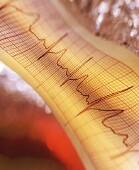
FRIDAY, Jan. 8 (HealthDay News) — A new study from the U.S. Food and Drug Administration and pacemaker manufacturers confirms that emissions from readers of ubiquitous radio frequency identification devices (RFIDs) can interfere with pacemakers, although that risk is small.
RFID tags are tiny, cheap electronic identifiers found in store security tags, hotel room keycards, automated toll booth sensors and other devices. Electronic readers can spot and “read” the information in the tags.
The new study, published in the January issue of the HeartRhythm Journal, examined the vulnerability to RFID reader electromagnetic interference in 15 pacemakers and 15 implanted cardioverter-defibrillators (ICDs).
The researchers concluded that the devices could cause disturbances in pacemakers and ICDs at low frequencies. “While modern pacemakers and ICDs use filters to minimize susceptibility to higher-frequency signals, there is limited filtering of low-frequency signals due to the design constraints of both pacemakers and ICDs,” the Heart Rhythm Society explained in a news release.
Studies conducted in the laboratory (the devices were not implanted) found that 67 percent of pacemakers and 47 percent of ICDs displayed some reaction to RFID readers. The risk for some sort of device reaction rose with the increasing proximity of the RFID reader to the pacemaker or ICD, the team noted.
Reactions included “pacing inhibition, inappropriate pacing, noise reversion mode, changed pacing rates, inappropriate delivery of antitachycardia pacing, inappropriate high-voltage shocks and device programming change,” according to the Heart Rhythm Society. They noted that, so far, the FDA has not received any reports from patients and their doctors of electromagnetic interference linked to an RFID system.
“We do not believe the current situation reveals an urgent public health risk,” study author Seth J. Seidman, a research electrical engineer for the FDA’s Center for Devices of Radiological Health, said in a news release from the society. “However, we are concerned that the continued proliferation of RFID without taking electromagnetic interference into consideration could cause clinically significant events for patients.”
The new study echoes a report published in 2008 in the Journal of the American Medical Association, in which Dutch researchers found that RFID devices might throw off medical equipment in hospitals.
More information
Find out more about pacemakers at the U.S. National Heart, Lung, and Blood Institute.

